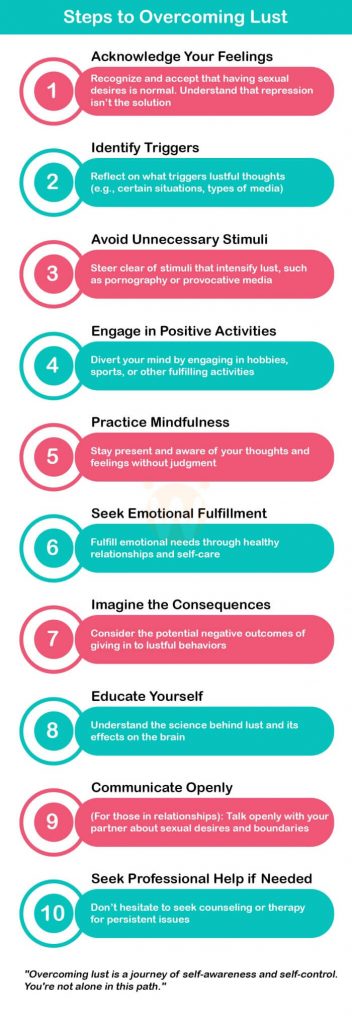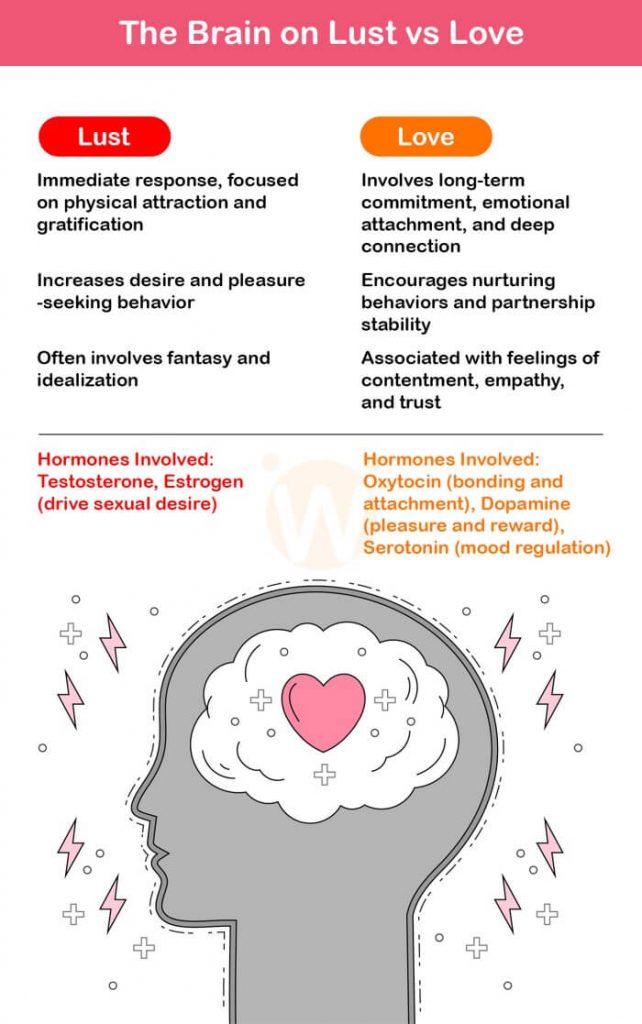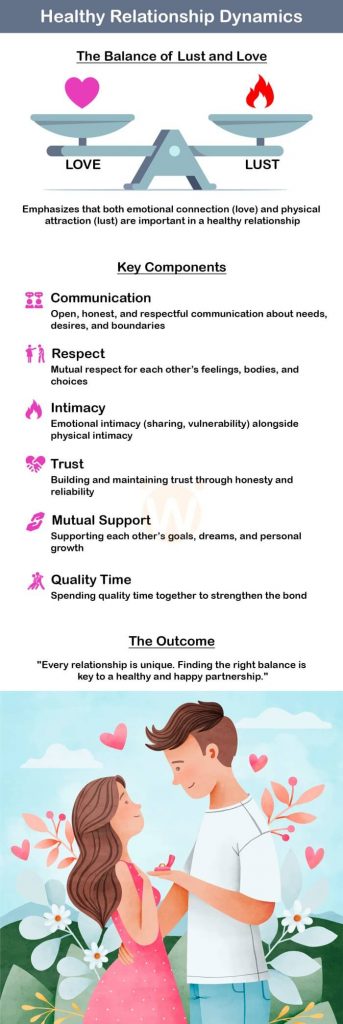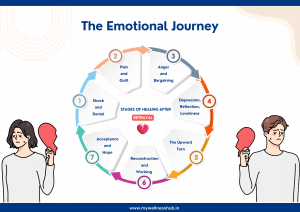How to Overcome Lust? What is lust and what causes lust in the brain?
By Prapoorna M
Last Updated: November 26, 2021
Being the emotional beings, we have all kinds of emotions like affection, attraction, love and lust. What happens if a person continues to eat for hours together though his hunger was satiated an hour back? What if he continues this habit? Well, there comes digestive problems, obesity and heart problems etc., etc., you know the list, right?
In the same way, we have the desires towards sexual pleasures, which are usually satisfied after a certain point. Just like after an intimate intercourse with the spouse. But if you keep on feeding the same thoughts to your brain, just imagine what happens!! It could get addicted and that turns out to be the lust. Lust is nothing but an unquenched thirst towards desires, mostly sexual.
Men-Women
Due to the biological differences out there, men and women have different kinds of arousal factors. Men usually tend to get aroused by the visuals like watching a woman’s private parts or visualizing scenes with her or watching porn, while women get aroused by the emotional closeness, romance, praising their body, showing the passion etc. On the contrary, every person has a right to say NO when they are not ready for such an act.
Both men and women need to appreciate that everyone has their own feelings and hence need to regulate them accordingly. Of course, we are human beings and we are supposed to train ourselves such that there won’t be any misuse of our senses.
For more on understanding emotional closeness and romance, especially in the context of relationship counseling, explore our relationship counseling services.
Overcoming Lust

First of all, acknowledge that having sexual desires is a very common thing for any being. Feeling bad about them could lead to unhealthy mental issues which could lead to making it even stronger. But what to do when there comes a threshold point of withholding our urges? This is a common problem in almost everyone that we come across. Let’s go through some important points that have to be kept in mind in order to overcome lust.

Avoid Attractions
Avoid unnecessary attractions that lure you into these thoughts of sex. Be away from those poisonous looks or unregulated activities that could ensnare you. Don’t let any thoughts or persons that could break the barriers of your personal fortress. Be strict to yourself by simply avoiding such situations.
Avoid watching porn
It is no wonder to know that there are a very little percentage of people in this world who don’t watch porn, especially those who are between 18 and 40. Watching porn has been a common thing these days, as this would actually rationalize our thinking by manipulating it like “not cheating” their spouse or that potential someone. But, there’s a lot more to it. The more you watch it, the more you get addicted. And, it is because of the increase in these viewers this dark industry is gaining high profits, leading to the human trafficking, especially the girl children.
Impact of Pornography on Lust
| Impact | Description | Source |
|---|---|---|
| Increased Lustful Thoughts | Regular consumption of pornography can lead to an increase in frequent and intense lustful thoughts. | Journal of Sexual Medicine |
| Distorted Sexual Expectations | Exposure to unrealistic scenarios in pornography can create distorted expectations of sexual encounters. | Psychology Today |
| Reduced Satisfaction | Long-term consumption may lead to reduced satisfaction with physical intimacy in real-life relationships. | Archives of Sexual Behavior |
| Addiction-like Symptoms | Can lead to behaviors akin to addiction, compelling the individual to seek out pornographic material. | American Journal of Psychiatry |
| Impact on Relationship Dynamics | Can lead to secrecy, shame, or guilt within relationships, potentially causing strain. | Family Relations Journal |
| Altered Brain Response | Changes in the brain’s response to sexual stimuli, similar to responses seen in other forms of addiction. | Neuroscience and Biobehavioral Reviews |
| Decreased Intimacy and Desire | May lead to decreased interest in physical intimacy with a partner due to desensitization. | International Journal of Impotence Research |
| Link to Risky Behaviors | Association with an increased likelihood of engaging in risky sexual behaviors. | Sexually Transmitted Infections Journal |
Unbeknownst, the porn watchers are harming the society, as well as themselves by getting addicted to porn. Yes, of course. Watching porn hampers your functioning in real sex, thus distancing to your real pleasures!!!
Understand more about the impact of technology on relationships and how to manage it.
Engage Yourselves
It is said that, “When our minds and hearts are occupied in the right place, sexual lust has little room to operate.” Engage yourself in other activities like focusing on a hobby or playing memorizing games etc., to divert your attention from unnecessary things. Plan your career ahead to avoid any mean attractions spoil you and encourage yourself by reminding continually about it.
Activities to Divert from Lustful Thoughts
| Activity | Benefits | Suggested Frequency |
|---|---|---|
| Physical Exercise | Increases endorphins, improves mood, reduces stress. | Daily, 30-60 minutes |
| Creative Hobbies | Enhances focus, promotes relaxation, boosts self-esteem. | 2-3 times a week |
| Mindfulness Meditation | Improves self-awareness, reduces impulsivity. | Daily, 10-20 minutes |
| Reading | Expands knowledge, diverts mind, relaxes the brain. | Daily, 30-60 minutes |
| Volunteering | Promotes empathy, connects with community. | Weekly, 2-4 hours |
| Cooking | Encourages creativity, provides sensory engagement. | 3-4 times a week |
| Nature Walks | Connects with nature, reduces anxiety and depression. | 3-5 times a week |
| Playing Music | Reduces stress, increases happiness, improves focus. | Daily, 30-45 minutes |
| Journaling | Facilitates emotional release, enhances self-reflection. | Daily, 15-30 minutes |
| Socializing | Builds relationships, increases feelings of belonging. | Weekly, as comfortable |
Imagine the consequences
If you can imagine the consequences of an extra marital affair or that uncontrollable lust, and if you try to imagine what happens next, that would eventually stop you from going further. The likely resultant consequences can be like getting into multiple affairs, having scattered family, devastated family members, kids abandoned and hating you to the core and finally moral degradation. If you are single, it could happen that this would be a big blow to your family and it would also affect your family life after you get married.
Read about the signs your marriage is falling apart and how to address them.
Know the science of Lust
If we can understand what happens to our brain when we think of sex more and more, we can regulate it in that way. The happy hormones and satisfactory hormones like oxytocin and serotonin get released in our brain making us to have it more. Interestingly, these hormones can also be made to release when you do some activities such as sporting, hiking, dancing, enjoying good food etc.

The front part of our brain is called as pre-frontal cortex, which helps us to analyze the situations and think rationally. But, lust clouds the pre-frontal cortex of your brain resulting in lowering your rational thinking. We, the human beings are the typical ones that trigger ourselves with something and beat ourselves for getting triggered. Oh come-on, it’s a body that functions on hormones!! What can be done when you tend to trigger them and blame them back for their response? As we have hunger, sleep and thirst, we have the urge to seek pleasures.
Emotional Needs
The need of expression, love, comfort and warmth come from the time of our birth. As an infant that cuddle and warm hug given by mom makes you feel secured. As a child, we experience the warmth in love in a sweet way and while growing up it differs from stage to stage. But at every stage, the release of oxytocin makes us happy, which we may find in different activities as we experience fun and pleasure. It is said that the same hormone is released when men and women experience orgasm. Hence, these are all nothing but the action of hormones, we undergo.
Married Ones
Most people don’t set out to cheat on their spouse. It all starts with small temptations of “just this” and “it’s okay as most people do” and you think “I know how and when to control myself” etc., etc. But this could slowly turn out into a huge problem, which can completely engulf your future while leading to character assassination. You might think that you could easily escape saying “he/she meant nothing to me”. But, it doesn’t work that way!!
Every married couple needs to talk openly about their sexual needs and should also encourage their spouse to do so. When inhibitions take their place in such discussions and when desires remain unfulfilled, that could result in unquenched lust. But, such an unquenched lust is the reason for extra marital relationships. Identifying and fulfilling the sexual needs of men and women and to see how they can be met within the context of marriage, is a must in a marital relationship. If you are unable to communicate, or if you feel that your marriage is going into a trouble, it is highly recommended to seek the help of a professional marital counselor.
Are you having a troubled marriage or a sex-less marriage? Are your marital issues bothering you? Talk to a therapist right now. Book an appointment or make an instant call to find out better solutions for your burning problems. All the best!!
For those seeking help in their marriage, consider our online marital counselling services.
Frequently Asked Questions for “Understanding and Overcoming Lust”
1. What is the difference between lust and love?
Lust is primarily driven by physical attraction and the desire for sexual gratification, often without deep emotional or personal connection. Love, on the other hand, encompasses a deeper emotional bond, commitment, and intimacy that goes beyond physical attraction.

2. Can lust be a part of a healthy relationship?
Yes, in a healthy relationship, lust can coexist with love. It contributes to the physical and romantic aspects of a relationship. However, it’s important for it to be balanced with emotional intimacy and mutual respect.

Learn more about maintaining a healthy relationship balance in our article on better ways to communicate in relationships.
3. How does lust affect our brain?
Lust triggers the release of certain hormones and neurotransmitters in the brain, such as dopamine and oxytocin, which produce feelings of pleasure and reward. However, excessive focus on lustful thoughts can affect the pre-frontal cortex, impacting rational thinking and decision-making.
4. Is it normal to experience lust?
Yes, experiencing lust is a normal part of human sexuality. It becomes a concern when it starts to dominate one’s thoughts or leads to harmful behaviors.
5. How can I differentiate between healthy sexual desire and problematic lust?
Healthy sexual desire is balanced and respects personal boundaries and consent. It’s integrated into a relationship without causing distress or harm. Problematic lust, however, might feel compulsive, lead to unhealthy behaviors, or interfere with daily life and relationships.
6. What are some strategies to manage lustful thoughts?
Strategies include engaging in meaningful activities, avoiding triggers like pornography, practicing mindfulness, and seeking emotional fulfillment in non-sexual ways. Professional counseling can also be beneficial.
7. Can excessive lust lead to relationship problems?
Yes, when lust overshadows other aspects of a relationship, it can lead to issues like infidelity, emotional disconnection, and a lack of genuine intimacy.
8. How can couples address issues related to lust in their relationship?
Open communication about sexual needs and desires, maintaining emotional intimacy, and seeking professional guidance if needed can help couples address issues related to lust.
9. Are there any health risks associated with excessive indulgence in lustful activities?
Excessive indulgence, especially if it leads to risky sexual behaviors, can increase the risk of sexually transmitted infections and psychological distress. It can also impact social and occupational functioning.
10. When should I seek professional help for issues related to lust?
If lustful thoughts or behaviors feel out of control, cause distress, harm relationships, or lead to risky behavior, it’s advisable to seek help from a mental health professional.
If you’re considering professional help, explore our online counselling services for personalized assistance.
About the Author:
Prapoorna Mangalampalli, Psychologist
Prapoorna, an author with dual master’s degrees in Psychology and English, excels in exploring and enhancing human experiences. Her writing, characterized by deep empathy and insight, primarily focuses on the complexities of counseling, spanning areas such as online, marital, relationship, child, family, and career counseling. Specialized training in various counseling sectors underscores her dedication to positive change. In her blogs, Prapoorna offers valuable guidance and a unique perspective for parents of children with Autism and special needs, creating a supportive community in this realm.
Book your Free Consultation Today
Parent/Caregiver Info:
Client’s Details:
* Error Message









